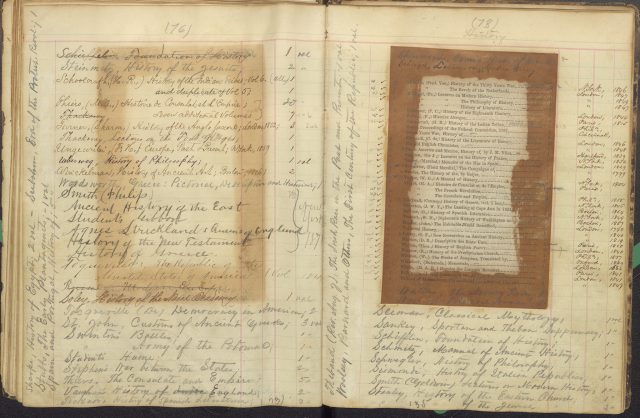
A ledger from 1868 is helping archivists identify which books are part of the university’s original library collection, 1849-1858. Photo courtesy Archives and Special Collections
OXFORD, Miss. – A celebration of the University of Mississippi‘s 175th anniversary this month would be incomplete without a nod to its academic underpinnings: the library and its original books.
The original collection of the library, dating from 1849 to 1858, reflects the classical curriculum of the era with a large number of Latin, Greek and rhetoric volumes. However, the collection includes a number of surprising topics such as Napoleon, ship navigation, fossils and travels in places such as Burma that had little to do with the landlocked university in Oxford.
Leigh McWhite, the libraries’ political papers archivist and professor, is searching for, researching and taking these books out of main circulation to curate a permanent display in the Baxter Room of the J.D. Williams Library.
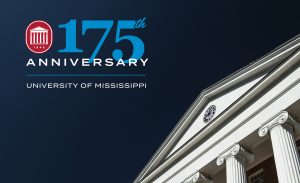 “As a set, these books represent an important aspect of our university’s history because they showcase the curriculum and what was studied,” McWhite said. The books also offer insight into the faculty’s interests at the time, she said.
“As a set, these books represent an important aspect of our university’s history because they showcase the curriculum and what was studied,” McWhite said. The books also offer insight into the faculty’s interests at the time, she said.
Until recently, library patrons could check out many of the books in the original collection. These books will still be available for reading and research, but only upon request, she said. Extremely rare books, such as a Royal Octavo second edition of “Birds of America” by John James Audubon, published in 1856, will continue to be housed in Archives and Special Collections, and an eGrove page also will be devoted to the collection.
Before the university’s collection of books moved to Ventress Hall in 1889, the third floor of the Lyceum housed a small library. It began in July 1849 when UM founder and trustee Jacob Thompson donated books to the university. The board also appropriated $500 – which would be almost $20,000 today – for the purchase of additional tomes.
By 1858-59, the libraries – university, law and two literary societies – housed about 6,000 volumes. Bryant Hall followed Ventress as the university’s library in 1911 before the J.D. Williams Library was built in 1951.
Today, the University Libraries hold more than 1 million physical volumes, as well as more than 1.5 million e-books.
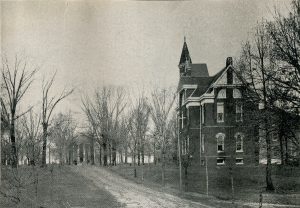
Ventress Hall housed the university’s library for many years. This photo is from the 1898 yearbook. Photo courtesy Archives and Special Collections
Few university records exist from the university’s early years, but an 1868 ledger provides crucial information to help determine which books were part of the original collection.
Giles M. Hillyer, a university graduate who served on the board of trustees, cut and pasted two copies of the 1858 printed catalog into the 1868 ledger and hand-wrote notations and additions.
It is “one of the most complete documents focusing on the institutional library in any southern college or university following the Civil War, because few original resources are extant,” according to Boyd Childress in his article “The 1868 Catalog of the University of Mississippi,” published in the journal Libraries & Culture in 1991.
A few highlights from the original library collection include:
Scribbles
These days, writing in library books is frowned upon. However, many books in the original library collection include elegant, erudite inscriptions and commentary. Here are a few examples:
- A faint inscription across the title page of “English Synonymes: with Copious Illustrations and Explanations, Drawn from the Best Writers,” by George Crabb, published in 1849, reads: “Don’t steal this book my honest friend for fear the gallows will be your end. Anon.”
- Handwritten on the title page of a book about fossils: “Tableau des genres de vegetaux fossils consideres sous le point de vue de leur classification botanique et de leur distribution geologique,” by L. Martinet, 1849, is this poignant thought by Byron: “Shrine of the mighty can it be that this is all that’s left of thee.”
- One active reader added at least seven comments in “The Life of Field Marshal Souvarof; with Reflections upon the Principal Events, Political and Military, Connected with the History of Russia During Part of the Eighteenth Century,” by L.M.P. de Laverne, published in 1814. Among the comments are “… what sophistry” and “It is unfortunate that historians are not generals-in-chief of armies!!!”
Female Authors
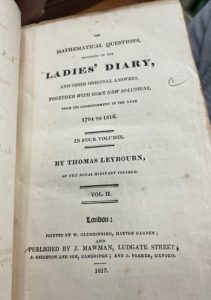
‘The Ladies’ Diary,’ a book in the original collection, is believed to be one of the first English language publications devoted to women. Photo with permission of J.D. Williams Library
Another enlightening book in the collection is “The Mathematical Questions Proposed in the Ladies’ Diary, and Their Original Answers, Together with Some New Solutions, from Its Commencement in the Year 1704 to 1816,” by Thomas Leybourn, published in 1817.
“The Lady’s Diary” (later the “Lady’s and Gentleman’s Diary”) is one of the first English language publications devoted to women. This book in the original library suggests that male students and faculty were open to reading publications by and about women before the university became coed in the 1880s.
“I’m surprised by the number of female authors,” McWhite said. “There’s a book on the education of women in the original library. And we have an astronomy and math book by a female author.”
Lots of Napoleon
Two tomes, “History of the Expedition to Russia, Undertaken by the Emperor Napoleon in the Year 1812,” by Philippe-Paul Segur, published in 1841, and “Napoleon and the Grand Army in Russia, or A Critical Examination of the Work of Count Ph. de Segur,” by Gaspard Gourgaud, published in 1825, are among 17 that have been found so far on Napoleon Bonaparte as part of the original library collection.
“We have what we think is an unexpected amount of material on Napoleon,” said Stan Whitehorn, UM head of library facilities. “There were more books about Napoleon than there were about (George) Washington.”
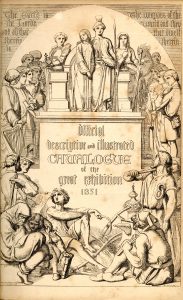
A detailed illustration on the frontispiece of an 1851 book. Photo courtesy Archives and Special Collections
A possible explanation for so many books on the famous French military commander is that Felix LeBauve (1809-1879) might have donated them, McWhite said. LeBauve was a French-born American politician, businessman, newspaper publisher and Mississippi state senator. His father was a French soldier at Yorktown during the American Revolution and later campaigned under Bonaparte.
LeBauve established the first scholarship at Ole Miss, and the “Felix LaBauve Collection” resides in Archives and Special Collections. This collection includes a framed Legion of Honor certificate issued to LaBauve’s father and signed by Napoleon.
Also of note is that the authors Segur and Gourgaud, mentioned above, dueled over their differing views of Napoleon, and Segur was wounded during the confrontation.
Navigational Books
One uncommonly long title in the original collection is “The American Coast Pilot; Containing the Courses and Distances between the Principal Harbours, Capes and Headlands, from Passamaquoddy through the Gulf of Florida; with Directions for Sailing into the Same … Together with the Courses and Distances from Cape Cod and Cape Ann to George’s Bank … with the Latitudes and Longitudes of the Principal Harbours on the Coast; Together with a Tide Table,” by Edmund M. Blunt, 1817.
An inscription in this book reads “From A.W. Baker to [Lt] Allen Deas U.S.S. Jn. Adams, West Indies Station, 1825.”
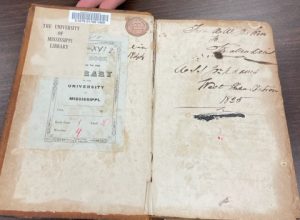
An inscription on the inside of ‘The American Coast Pilot,’ published in 1817, reads ‘From A.W. Baker to [Lt] Allen Deas U.S.S. Jn. Adams, West Indies Station, 1825.’ Note the blue bookplate that indicates the bookcase and shelf where the book could be found when the library was in Ventress. Photo with permission of J.D. Williams Library
McWhite surmised Deas and crew were hunting pirates and wondered how the university ended up with this book, as well as other books on sea navigation.
“Somehow, for an inland university, we’ve got an amazing amount of books in the original library that are dealing with navies and navigation. I imagine that there was a donor who gave a selection of books because that was his interest.”
For more information about the original library collection, contact McWhite at slmcwhit@olemiss.edu.